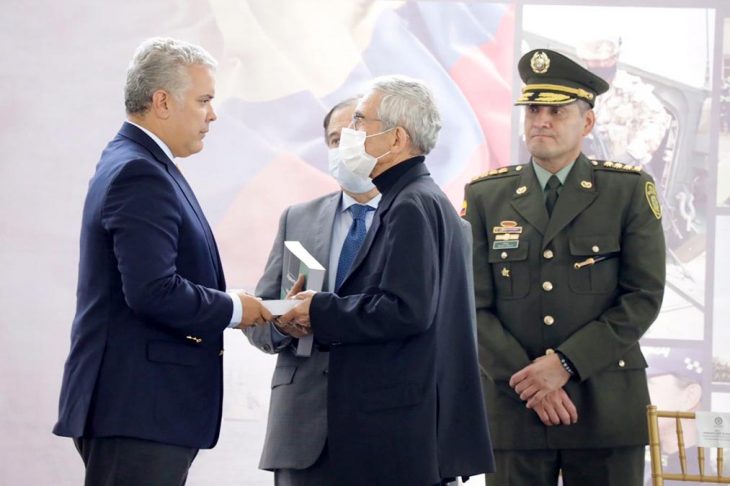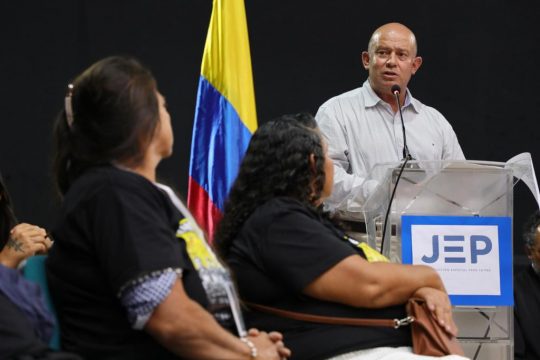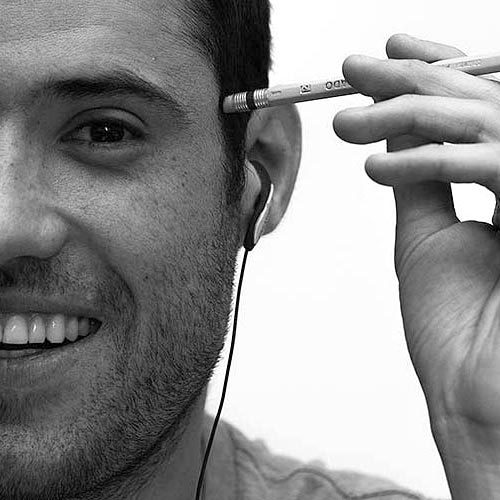The past four months have brought the most significant attribution of responsibility and truth-telling in Colombia regarding crimes committed by the military.
First, in April and then July, two groups of former military officials - including a general and five colonels - admitted to participating in the extrajudicial executions of hundreds of young men passed off as rebels killed in combat. In front of their victims’ families, they asked for forgiveness and accepted the Special Jurisdiction for Peace (JEP) charges of war crimes and crimes against humanity, those of the highest most international reproach.
Almost at the same time, at the end of June and after more than three years of work, the Truth and Reconciliation Commission (TRC) unveiled its final report on half a century of violence in Colombia, which - among other issues - urges the state to acknowledge collusion between members of the army and paramilitary groups as well as the 'false positives', as Colombians have known these executions of civilians by the military.
But the military and the defence sector have insisted on a different narrative. Under the outgoing government of President Iván Duque, the army and the Defence Ministry have steadfastly held to the theory that these crimes were committed by isolated members of the military and in no way involved the institutions, two narratives that were laid down in a report that they also published this year and officially presented to both the TRC and the JEP.
Their position, however, is becoming uneasy with the changes in the political scene. Since three weeks ago, Gustavo Petro has been leading the first left-wing government in the country's history, with the dual promise of implementing the peace agreement reviled by his predecessor and following the TRC’s recommendations, including the security sector’s reform.
The military’s counter truth report
On February 25th, four months before the Truth Commission unveiled its report, the Duque administration presented its own document titled 'A contribution to truth: the security forces’ context towards historical memory'.
Over 733 pages, the book traces the history of the Armed Forces and the Police in the internal armed conflict, how its members were victimised and the evolution of military doctrine and its international humanitarian law and human rights policy over half a century. Described as "an academic investigation", it was published by the Defence Ministry with one of the largest national publishing houses and written by a group of professors from the Sergio Arboleda University - known for its conservative stances - and the Superior War College, a military-led officer training institution under the aegis of the General Command of the Armed Forces.
The outgoing government gave it wide publicity. President Duque described it as "a historic report that gathers the testimony of law enforcement" and "an unquestionable history" about their adherence to legality and their contribution to peace. "We’re concerned that, five years after the Havana agreement and with ten years to go in its implementation, the spotlight is being directed at the security forces and not at the real perpetrators," said then Defence Minister Diego Molano. In the following months, both used it to ask the JEP to open a macro-case on crimes committed by the FARC against soldiers and police.

“Individual acts”, according to the military’s report
The military's report says that "the doctrine of body counting, as the US action in Vietnam has been called, was never adopted in Colombia, and despite the fact that it has been linked to the crimes of homicide of protected persons and/or aggravated homicide (also known as extrajudicial executions), this has no doctrinal reference in Colombia".
It also distances itself from the TRC’s conclusion that the national security model was based for decades on the 'doctrine of the internal enemy', inherited from the Cold War and which allowed to persecute opponents - from opposition politicians to peasants. According to the defence sector report, "there is no conclusive or even reliable evidence that the Colombian army has adopted the doctrine to persecute or annihilate an internal enemy", like what took place in Argentina or Chile.
Perhaps the point where they diverge most is on how widespread the extrajudicial executions committed by the military were. The report admits that such crimes did occur, but stresses that there was "a zero tolerance policy" towards them, that corrective measures reduced them, and that both the Defence Ministry and the army aided the justice system in investigating them.
"Although there were civilian deaths that constitute homicide of a protected person, these cases were not the result of a policy," the text says. They were, in the words of former minister Molano, "individual acts" that "do not reflect the generalised actions of military and police institutions".
“Sophisticated cover-ups”, answers the JEP
Conversely, the JEP states that the practice of counting combat casualties became a success indicator of the military effort – more so than the arrest or demobilisation of rebels - and contributed to a spike in the number of false positive victims. It also soundly rejected the 'rotten apple' when it concluded, after four years of inquiries and hundreds of testimonies, that such executions were widespread and systematic.
In its first two accusations, the tribunal exhaustively details the different modus operandi and strategies used by soldiers to present the murder of civilians as "fictitious operational results", revealing similar patterns in hundreds of cases. As Justice Info reported, the JEP reconstructs how they simulated combat zones and planted evidence to link their victims to illegal armed groups, going so far as to dress them in camouflage, move bodies and contaminate crime scenes, in what it termed "increasingly sophisticated cover-ups". There was also, according to the JEP, legal staging with forged operational documents, coordinated accounts of events, threats to witnesses and destruction of evidence, including after visits by the 2008 fact-finding mission led by General Carlos Arturo Suárez.
This was the basis on which it charged 25 former officials with having been part of "criminal organisations embedded within military units" and "organised power apparatuses" within the Armed Forces that, according to its findings, killed at least 6,402 civilians between 2002 and 2008. A month ago, it charged a further 22 persons - including a general and five colonels - in a third decision in the case, in Casanare, a central eastern region of Colombia, meaning it has made progress in three of six regions it prioritised.
The JEP has been careful to point only to individual responsibilities. It agrees with the military that corrective measures succeeded in curbing killings, although it emphasises that these crimes were made possible by a series of "institutional resources” such as budget, incentives and administrative procedures, as well as a lack of supervision by superiors.
“A denialist attitude”, says the TRC
The Truth Commission holds a similar view. In its central chapter on 'findings and recommendations', which summarises its 10,000-page report, the TRC took care not to attribute the crimes to the institution, speaking of "crimes committed by members of the security forces" and stressing that "large sectors of the Colombian security forces have carried out their role convinced this is the best thing for the country, being honest and loyal to their mission".
But it does point to the responsibility of the defence sector - both its military and civilian components -, explaining that "by favouring deaths in combat over any other military result, serious human rights violations and breaches of international humanitarian law were encouraged" and that these "crimes were facilitated by a system of legal and extra-legal provisions originating in the government itself and implemented by the military".
The TRC was particularly critical of the historical refusal of the government and the military to acknowledge clearly that members of their forces killed defenceless civilians or colluded with paramilitaries. "A denialist attitude has prevailed in the state, which has not accepted institutional responsibility for the crimes," it said, dubbing it as a persistence factor in the armed conflict.
This analysis led the Commission to stress in its recommendations the urgency of security sector reform, in order to - in its view - approach security as "a public good centred on people". Its list of suggested measures includes moving the National Police from the Defence Ministry to guarantee its civilian role, preventing the military criminal justice system from handling serious human rights violations, stopping the promotion of officers with credible complaints, strengthening whistle-blower channels, gradually dismantling compulsory military service, rethinking the army's security agreements with private companies, transforming sexist or derogatory military chants, reforming the anti-riot police, and rethinking drug policy.
The “open-minded” vs the “intransigent”
This difference of views is not new, but rather evidence of the tumultuous relationship that the military has had with historical memory over the last fifteen years.
Political scientist María Emma Wills, who worked at the National Centre for Historical Memory for a decade, sees two blocs within the defence sector with varying attitudes towards accountability. One bloc, which she dubs "open-minded", believes in it and is willing to own up to the fact that some of its members and policies were part of the problem, while the other bloc - which she calls "intransigent" - only accepts the roles of hero and victim for the institution. While the former led during the peace negotiations with the FARC during the Santos administration, the latter gained prominence during the Duque administration.
In any case, both - Wills argues - share the idea that military honour cannot be tarnished and that the institution must remain free of any suspicion. The sector more open to accountability, she says, "is willing to admit the existence of rotten apples within its ranks, but doesn’t conceive of speaking about clarification of how and why public security officials were involved in repeated violations. Those are fundamental elements for non-recurrence".
“Maintaining institutional legitimacy”
Since the peace process with the FARC, the defence sector has understood the fundamental role of historical memory. As a 2017 military presentation states, "the imposition of the past will shape the legitimacy of the Armed Forces and its perception by future generations of Colombians". That is why, according to this document, that forms part of its transformation plan, the goal is to "maintain institutional legitimacy".
A central question remains: how is this achieved? Participating in the transitional justice is one way in which the defence sector has been active, delivering 158 documents to the Truth Commission and 11 to the JEP. But in contrast, the military - as well as civilians in the Defence Ministry and the government - have been reluctant to engage in a substantive discussion concerning internal reforms that could ensure that crimes never happen again.
Such a stance contrasts with that of the transitional justice, which views legitimacy as emanating from owning up to atrocities and omissions. Father Francisco de Roux, the TRC’s president, put it to them with a simile touching the institution he personally hails from: the Catholic Church. "I invite you as a Colombian citizen to follow the example of Pope Francis, in the face of abuse of children by priests, when he admitted these were not rotten apples but a disease in the body of the Church," he said publicly to General Eduardo Zapateiro, until recently the Army’s commander. "No institution can defend itself in the face of repeated high-level moral misconduct among its men by saying that it’s not responsible because its laws forbid it (...) I want my country’s army to have the same greatness that the Church had".
A defence sector in transformation
The JEP hearings and the publication of the TRC’s final report come, in any case, at a time of sweeping political changes, with the arrival in power of a left-wing, pro-peace agreement government. In addition to announcing that it will remove the police from the defence sector and change drug policy, Petro's government completely overhauled the military and police top brass, retiring 55 generals - 45% of the total - between the two institutions, and announced that the TRC’s report will be studied in the country's schools.
403,000 MILITARY AND POLICE VICTIMS
The military sector’s report establishes that 403,352 members of the security forces were victims of the armed conflict – although the figure doesn’t appear in the main text, but in the foreword written by the former Minister of Defence, Diego Molano, where he attributes the full figure –without evidence- entirely to the Revolutionary Armed Forces of Colombia (FARC). Its authors established that 1,643 soldiers and police were kidnapped, 6,828 disappeared and 495 recruited as children, while 40,000 were victims of selective homicides, 188,000 of displacement and 7112 of landmines and other prohibited explosive devices . In the report's view, all these crimes "were committed in a consistent manner" between 1964 and 2018, and therefore "constitute a systematic pattern" and should be considered as war crimes and crimes against humanity.








